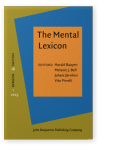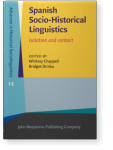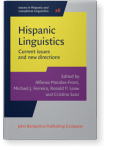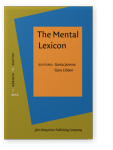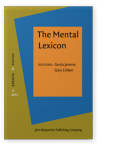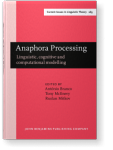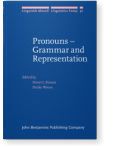Maria Mercedes Piñango
List of John Benjamins publications for which Maria Mercedes Piñango plays a role.
2023 The time-course of contextual modulation for underspecified meaning: An eye-movement study The Mental Lexicon 18:1, pp. 41–93 | Article
Sentences like (1) “The singer began the album” are ambiguous between an agentive reading (The singer began recording/playing/etc. the album) and a constitutive reading (The singer’s song was the first track). The ambiguity is rooted in the meaning specification of the aspectual-verb class,… read more
2023 Cognitive underpinnings of the meaning of Spanish estar: Implications for its diachronic change Copulas in Spanish and Beyond, Gumiel-Molina, Silvia and Isabel Pérez-Jiménez (eds.), pp. 367–388 | Article
The Spanish copula verb estar is currently taking part in two of the most well-known paths of semantic change across different dialectal varieties of Spanish: (a) as a main copula verb, in its encroachment on the domain of ser, and (b) as the auxiliary in the Present Progressive marker, as it… read more
2021 Language variation and change through an experimental lens: Contextual modulation in the use of the Progressive in three Spanish dialects Spanish Socio-Historical Linguistics: Isolation and contact, Chappell, Whitney and Bridget Drinka (eds.), pp. 77–102 | Chapter
Spanish exhibits two markers to convey a progressive meaning: the Simple Present and the Present Progressive. The use of these markers is contextually biased: the Simple Present requires contexts where speaker and addressee share perceptual access to the situation at issue, while the Present… read more
2020 The Progressive-to-Imperfective shift: Contextually determined variation in Rioplatense, Iberian, and Mexican Altiplano Spanish Hispanic Linguistics: Current issues and new directions, Morales-Front, Alfonso, Michael J. Ferreira, Ronald P. Leow and Cristina Sanz (eds.), pp. 119–136 | Chapter
Spanish has two markers (claimed to be in free alternation) to convey that an event is in progress at reference time: the Simple Present (e.g., canta, ‘sings’) and the Present Progressive (e.g., está cantando, ‘is singing’). Based on evidence from sentence acceptability studies in three… read more
2012 Complement Coercion: Distinguishing between type-shifting and pragmatic inferencing The Mental Lexicon 7:1, pp. 58–76 | Article
Although Complement Coercion has been systematically associated with computational cost, there remains a serious confound in the experimental evidence built up in previous studies. The confound arises from the fact that lexico-semantic differences within the set of verbs assumed to involve coercion… read more
2011 Processing light verb constructions The Mental Lexicon 6:3, pp. 393–413 | Article
Henry gave Elsa a kiss
give
kiss
give
a kiss
We test two approaches to light verb constructions: (1) joint predication in light verb constructions is stored as pre-specified, and their high frequency predicts less processing cost. (2) Joint predication in light verb… read more
2005 Pronominal Interpretation and the Syntax-Discourse Interface: Real-time Comprehension and Neurological Properties Anaphora Processing: Linguistic, cognitive and computational modelling, Branco, António, Tony McEnery and Ruslan Mitkov (eds.), pp. 221–238 | Article
2002 Cortical reflections of two pronominal relations Pronouns – Grammar and Representation, Simon, Horst J. and Heike Wiese (eds.), pp. 233–252 | Article
